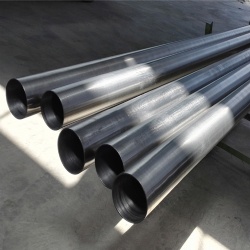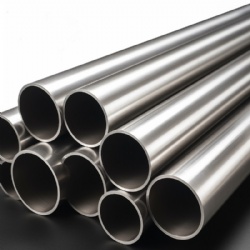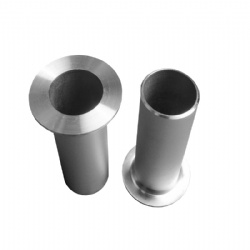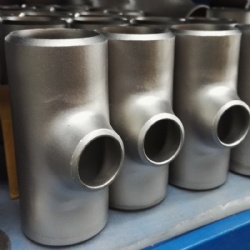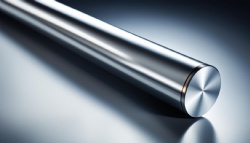Products >> Titanium >>
titanium pipe price per kg
- Product No.:2023114104241
Discover the extraordinary properties of titanium pipes in our comprehensive guide. From unrivaled strength and durability to versatile applications, titanium has emerged as a remarkable metal with incredible properties. Whether you are a materials engineer, construction professional, or simply curious about this extraordinary element, our guide will unravel everything you need to know about titanium pipes.
Titanium, known for its lightweight yet impressive strength, is becoming increasingly popular across various industries. Its high corrosion resistance, exceptional heat tolerance, and non-magnetic nature make it a sought-after choice for applications ranging from aerospace engineering to medical implants.
In this guide, we delve into the key characteristics that set titanium pipes apart from other materials. We explore the manufacturing process, highlighting the techniques used to create reliable and efficient titanium pipes. Furthermore, we discuss the advantages and considerations of working with titanium pipes, allowing you to make informed decisions for your projects.
Join us as we navigate through the world of titanium pipes, uncovering the incredible strength, durability, and versatility of this remarkable metal.
Properties of titanium and its advantages in pipe manufacturing
Titanium is a chemical element with the symbol Ti and atomic number 22. It is a lustrous, silver-colored metal that is known for its strength, durability, and low density. Titanium has a melting point of 1,660 degrees Celsius, making it an ideal material for high-temperature applications.
One of the most significant advantages of titanium is its corrosion resistance. Titanium is highly resistant to corrosion, even in harsh environments, making it an ideal material for pipes that will carry corrosive liquids or gases. Titanium pipes are also resistant to erosion and abrasion, making them an ideal choice for applications that require high strength and durability.
Another advantage of titanium in pipe manufacturing is its lightweight. Titanium is one of the lightest metals, making it an ideal material for applications that require low weight and high strength. Titanium pipes are also non-magnetic, making them ideal for applications where magnetic interference is a concern.
Applications of titanium pipes in various industries
Titanium pipes have found applications in various industries, including aerospace, chemical processing, oil and gas, and medical. In the aerospace industry, titanium pipes are used in aircraft engines, airframes, and landing gear. The high strength and lightweight of titanium make it an ideal material for these applications.
In the chemical processing industry, titanium pipes are used in the production of corrosive chemicals. The high corrosion resistance of titanium makes it an ideal material for these applications. In the oil and gas industry, titanium pipes are used in pipelines, offshore drilling rigs, and subsea equipment. The high strength and corrosion resistance of titanium make it an ideal material for these applications.
In the medical industry, titanium pipes are used in the production of medical implants. Titanium is biocompatible, which means that it does not react with the body's tissues or fluids. This makes it an ideal material for medical implants such as pacemakers, dental implants, and joint replacements.
Comparing titanium pipes with other materials
When it comes to pipe manufacturing, titanium pipes have several advantages over other materials. For example, compared to steel pipes, titanium pipes are much lighter, stronger, and more corrosion-resistant. Steel pipes are also susceptible to erosion and abrasion, which can lead to leaks and failures.
Compared to copper pipes, titanium pipes are more corrosion-resistant and have a longer lifespan. Copper pipes are susceptible to corrosion, which can lead to leaks and failures. Titanium pipes are also more resistant to erosion and abrasion, making them ideal for applications that require high strength and durability.
Manufacturing process of titanium pipes
The manufacturing process of titanium pipes is a complex and precise process that requires specialized equipment and expertise. There are several techniques used to manufacture titanium pipes, including extrusion, welding, and seamless pipe manufacturing.
In the extrusion process, a billet of titanium is heated and forced through a die to create a pipe with a specific shape and size. In the welding process, titanium sheets are welded together to create a pipe. In the seamless pipe manufacturing process, a billet of titanium is heated and rolled to create a pipe without any seams.
Factors to consider when choosing titanium pipes
When choosing titanium pipes, several factors need to be considered, including the application, the environment, and the cost. The application will determine the size, shape, and type of titanium pipe required. The environment will determine the corrosion resistance and strength required for the pipe. The cost will depend on the size, shape, and manufacturing process of the pipe.
Maintenance and care tips for titanium pipes
To ensure the longevity and performance of titanium pipes, proper maintenance and care are essential. Regular cleaning is necessary to remove any dirt or debris that may accumulate on the surface of the pipe. Avoid using abrasive cleaners or materials that can scratch the surface of the pipe. Inspect the pipe regularly for any signs of damage or wear and tear.
Cost considerations of titanium pipes
The cost of titanium pipes can vary depending on several factors, including the size, shape, and manufacturing process. Titanium is a relatively expensive material compared to other metals such as steel and copper. However, the benefits of titanium, including its strength, durability, and corrosion resistance, make it a cost-effective option for many applications.
Case studies and success stories of using titanium pipes
There are several success stories and case studies of using titanium pipes in various industries. For example, in the aerospace industry, titanium pipes have been used in aircraft engines and landing gear, resulting in increased efficiency and reduced weight. In the medical industry, titanium pipes have been used in medical implants such as joint replacements, resulting in improved patient outcomes and reduced complications.
Conclusion: The future of titanium pipes in the industry
Titanium pipes offer significant advantages over other materials, including high strength, durability, and corrosion resistance. As more industries seek lightweight, high-strength, and corrosion-resistant materials, the demand for titanium pipes is likely to increase. With continued research and development, titanium pipes are likely to become even more versatile and widely used in various industries.
Contact Us

Name: Mr. Ren
Tel: +86-18292471213
E-mail: info(at)intemetal.com
Add: Middle Section Baotai Road, Weibin District, 721013, Baoji, Shaanxi Province, China









